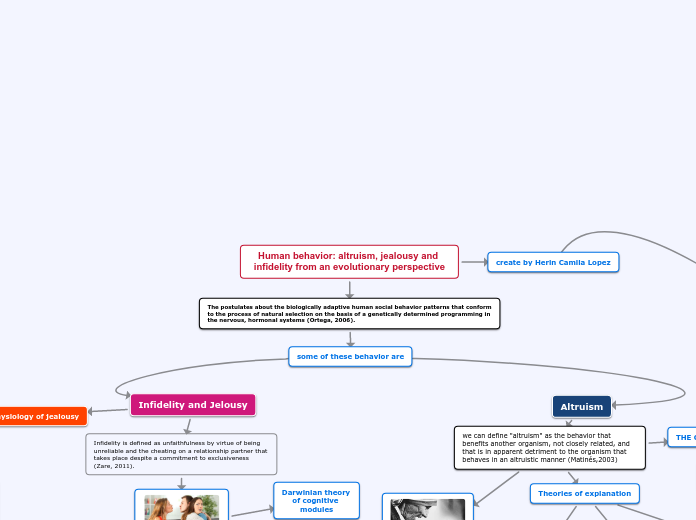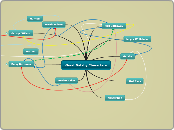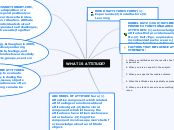reproductive success
Human behavior: altruism, jealousy and infidelity from an evolutionary perspective
create by Herin Camila Lopez
REFERENCES
Zare, B. (2011). Review of studies on infidelity . IPEDR vol.19 Recupérate to: http://www.ipedr.com/vol19/34-ICAMS2011-A10054.pdf
ORTEGA, L. (2006). PARALELOS EVOLUTIVOS EN EL ESTUDIO DEL COMPORTAMIENTO: CONSIDERACIONES EN TORNO AL PROBLEMA DEL MODO CAUSAL. Revista Latinoamericana de Psicología, volumen 38, No 1, p. 103-118: recuperado de: http://www.scielo.org.co/pdf/rlps/v38n1/v38n1a07.pdf
Martinez, M. (2003). La evolución del altruismo. Revista Colombiana de Filosofía de la Ciencia Vol. 4 Págs. 27-42. Recuperado de: http://www.redalyc.org/pdf/414/41400902.pdf
Harris, C. (2000). Psychophysiological Responses to Imagined Infidelity: The Specific Innate Modular View of Jealousy Reconsidered. Journal of Personality and Social Psychology Vol. 78 (6). Pag 1082-1091. DOI: 10.1037//0022-3514.78.6.1082
Buss, D. M., Shackelford T. K., Kirkpatrick, L. A., Chloe, J., Hasegawa, M., Hasegawa, T., et al. (1999). Jealousy and the nature of beliefs about infidelity: Tests of competing hypotheses in the United States, Korea, and Japan. Personal Relationships, 6(1), 125- 150
Buss, D. M. (Ed) (2016). The Handbook of Evolutionary Psychology. Volume 2. Cap. 18. Pag, 528-547
The postulates about the biologically adaptive human social behavior patterns that conform to the process of natural selection on the basis of a genetically determined programming in the nervous, hormonal systems (Ortega, 2006).
some of these behavior are
Altruism
we can define "altruism" as the behavior that benefits another organism, not closely related, and that is in apparent detriment to the organism that behaves in an altruistic manner (Matinés,2003)
THE COSTS AND BENEFITS (Buss, 2016)
Mother and Granmthers
survival of the offspring
https://www.efeverde.com/wp-content/uploads/2016/04/babuino-hamadryas-EFE-Rainer-Jensen.jpg
https://encrypted-tbn0.gstatic.com/images?q=tbn:ANd9GcR_nzE_CMkhNIvBdUJiIsbTt09IYi49CcUK36JUDPoupr4XuCqbmw
Theories of explanation
SINGLE LOCUS KIN RECOGNITION SYSTEMS
conjectured if a gene gave rise to a recognizable phenotype
and at the same time induced the bearer to benefit individuals sharing that phenotype
would spread faster and prevail over competing genes
KIN RECOGNITION
combination of couples as evidence of a kinship recognition mechanism (Buss,2016)
considering
human capacity to detect family similarities
HAMILTON’S THEORY OF KIN ALTRUISM
altruism, while benefiting the recipient, reduces the altruistic physical fitness (Buss, 2016)
if natural selection disapproves of traits that impose a cost on physical fitness
reduces reproductive success
while it favors those who benefit physical fitness
increases reproductive success
Infidelity and Jelousy
Psychophysiology of jealousy
How are they studied?
The research techniques used to investigate the type of infidelity that is most annoying for each sex, originally incorporated psychophysiological records and self-reports (Buss et al., 1999)
female
women develop through the
phylogeny, a greater sensitivity to situations that threaten male parental investment in joint reproduction (Buss, 1999)
https://encrypted-tbn0.gstatic.com/images?q=tbn:ANd9GcRQ77QI4YDb82Q_CJ7Qe5CB3QxRmyVMIyhKGnH-9EJGw8FMfBkq
Men
jealousy would evoke anger and a strong motivation for action (Buss, 1999)
http://2.bp.blogspot.com/-CEC0EWwVuOk/TyvU9XDPwHI/AAAAAAAAADA/XcF2ySP5DP0/s1600/violencia_domestica_1-1.jpg
Infidelity is defined as unfaithfulness by virtue of being unreliable and the cheating on a relationship partner that takes place despite a commitment to exclusiveness (Zare, 2011).
recuperate to: http://los40mx00.epimg.net/los40/imagenes/2018/12/06/moda/1544111399_773427_1544111492_gigante_normal.jpg
Darwinian theory of cognitive modules
recuperate to: https://encrypted-tbn0.gstatic.com/images?q=tbn:ANd9GcRjEkcjMMGSYg2GJIHxc8caYJQMIwH6hyge6Os6vMXzyDt4P1xY
These theorists argued that men and women have different innate cognitive or emotional "modules" that determine their reactions to a couple's infidelity
Evidently, men show more physiological reactivity to imagined sexual infidelity than to emotional infidelity (Harris, 2000)
These studies find that most women report that emotional infidelity which would be worse than sexual infidelity,
Gender Differences
Harris (2000) mentions that evolutionary psychologists have proposed a theory of gender differences in jealousy, which states that men and women have an innate predisposition to react differently to sexual infidelity versus emotional
Male
Differences in jealousy pose the hypothesis that men are upset by sexual infidelity (Harris, 200)
Female
women are upset by emotional infidelity (Harris, 2000)









